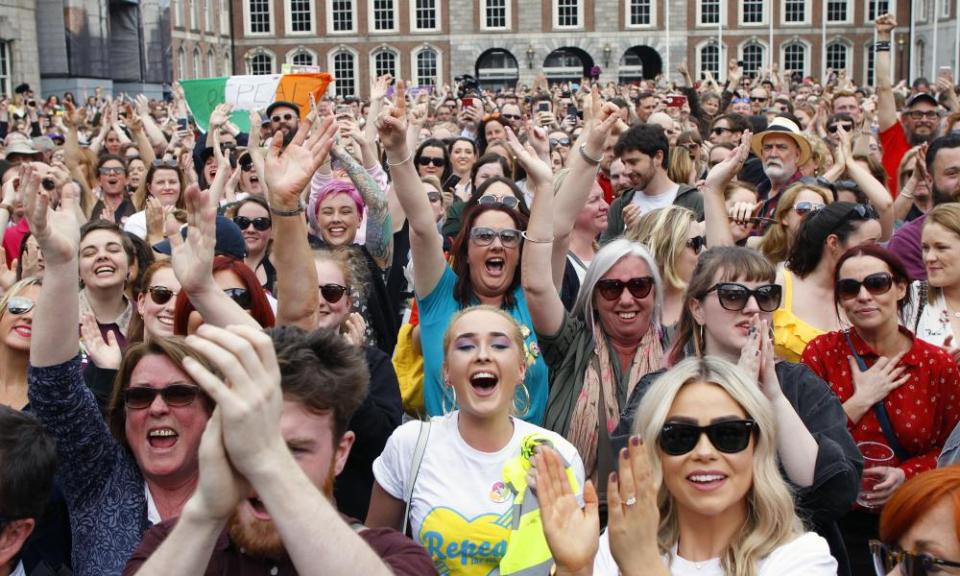The Observer view on Ireland’s historic abortion vote

For decades, Irish women with an unviable or unwanted pregnancy have faced an impossible choice. A choice between a lonely, and for many, prohibitively expensive, journey to a foreign country to seek a safe abortion; an attempt to do it themselves, risking death or criminal prosecution; or simply succumbing to a state that forces them to carry their pregnancy to term, regardless of whether they conceived through rape or fatal foetal abnormalities mean their baby will die at birth.
The Observer is the world's oldest Sunday newspaper, founded in 1791. It is published by Guardian News & Media and is editorially independent.
No more. Friday’s referendum – 66.4% in favour – in the end delivered a decisive majority in favour of repealing the Irish constitution’s eighth amendment, which since 1983 has recognised an equal right to life for both mothers and their unborn children, effectively prohibiting abortion in almost all cases.
The amendment has wreaked pain on countless Irish lives. The tragic, avoidable death of Savita Halappanavar in 2012 became the rallying cry for reform. Denied an abortion when she began to miscarry, she died of sepsis in hospital a week later. Over the years, there have been many more cases that illustrate the costs of religious fundamentalism trumping compassion and common sense, such as the case of a suicidal 14-year-old girl who became pregnant as a result of rape, and who the Irish courts tried to prevent accessing an abortion abroad.
The result, described by Leo Varadhkar, Ireland’s prime minister, as “the culmination of a quiet revolution in Ireland”, is extraordinary on two counts. First, in its decisiveness: watching thousands of young people flock home to vote by boat, train and plane, many thought that this vote would be a tale of two Irelands – older and younger; rural and urban; the past and the future.
That the resounding victory was not purely a result of generational displacement hints at an Ireland more unified than many believed. Alongside Ireland’s popular vote for equal marriage, it reveals just how much social attitudes have been transformed as a result of people with long-standing views changing their minds.
The result was also extraordinary for what it represents: not just an embrace of women’s reproductive rights, but a sweeping away of one of the last vestiges of church influence on the state. Decades of scandal – from the Catholic church’s role in running the Magdalene laundries, where thousands of unwed, pregnant women were imprisoned and abused, to the child sex abuse scandals – have eroded its moral legitimacy and left it vulnerable to charges of the most extreme hypocrisy. An institution that looked the other way when women in its protection were raped and children in its care were sexually abused cannot expect to command the moral obedience of a nation.
The Irish parliament is now set to legalise abortion on demand for the first 12 weeks of pregnancy, bringing Ireland into line with most of continental Europe, with abortion available up to 24 weeks on much more restricted grounds.
This will profoundly improve the lives of Irish women. But the result will also be felt beyond Ireland’s borders, most strongly and immediately in Northern Ireland, where the only way women can secure safe and legal abortion is to travel to the British mainland. The MP Stella Creasy is planning to force a parliamentary vote on the issue, but liberalisation is strongly opposed by the anti-abortion DUP, on whose votes the government relies at Westminster. The DUP cannot claim to speak for Northern Ireland, where there is a clear majority in favour of liberalisation. It would be unforgivable for Theresa May to trade away the rights of British women in exchange for the DUP’s parliamentary support.
The fact that we will see a more liberal approach to abortion in Dublin than in Liverpool, at least in the first 12 weeks of pregnancy, should also give pause for thought. Our antiquated abortion law – under which abortion remains a criminal offence and a woman is only permitted an abortion if two doctors confirm continuing with the pregnancy poses a serious risk to her physical or mental health – is demeaning and paternalistic.
Yesterday’s result also offers hope to the 1.25 billion women globally who have no access to safe abortion. It will offer succour to those women’s rights campaigners in countries such as the US and Poland battling against restrictions in abortion rights being pushed by religious conservatives. And it will offer hope to those working to achieve social change across the globe. Like the campaign for equal marriage, the Irish campaign for repeal shows that over the years it is possible to change people’s minds, to build a coalition, to use arguments framed in compassion and pragmatism to bring along those who lean towards social conservatism.
And so the reverberations of what is first and foremost an Irish victory for women’s reproductive rights will be felt across the world. The long arc of the moral universe may bend towards justice, but only if some of us take responsibility for guiding it there. Like the great civil rights movements that preceded it, the Irish campaign for the repeal of the eighth stands as a potent and contemporary reminder that it can be done.

 Yahoo News
Yahoo News 